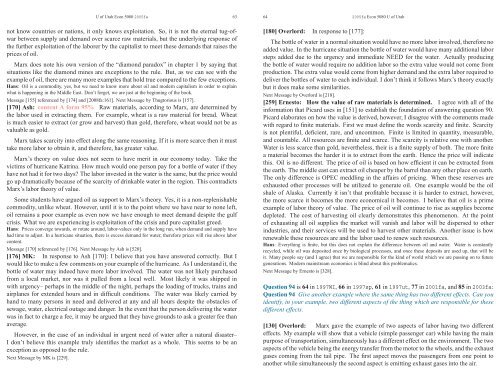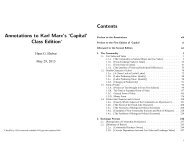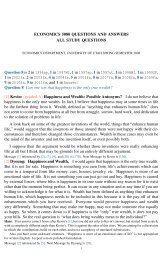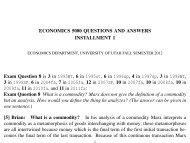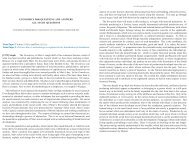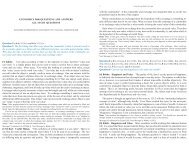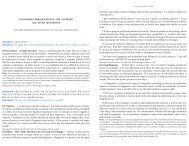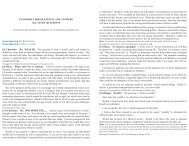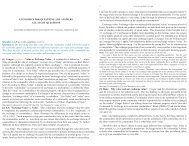Question 1 What did Marx mean with his formu - University of Utah
Question 1 What did Marx mean with his formu - University of Utah
Question 1 What did Marx mean with his formu - University of Utah
You also want an ePaper? Increase the reach of your titles
YUMPU automatically turns print PDFs into web optimized ePapers that Google loves.
U <strong>of</strong> <strong>Utah</strong> Econ 5080 2005fa 63<br />
not know countries or nations, it only knows exploitation. So, it is not the eternal tug-<strong>of</strong>war<br />
between supply and demand over scarce raw materials, but the underlying response <strong>of</strong><br />
the further exploitation <strong>of</strong> the laborer by the capitalist to meet these demands that raises the<br />
prices <strong>of</strong> oil.<br />
<strong>Marx</strong> does note <strong>his</strong> own version <strong>of</strong> the “diamond paradox” in chapter 1 by saying that<br />
situations like the diamond mines are exceptions to the rule. But, as we can see <strong>with</strong> the<br />
example <strong>of</strong> oil, there are many more examples that hold true compared to the few exceptions.<br />
Hans: Oil is a commodity, yes, but we need to know more about oil and modern capitalism in order to explain<br />
what is happening in the Middle East. Don’t forget, we are just at the beginning <strong>of</strong> the book.<br />
Message [155] referenced by [174] and [2008fa:161]. Next Message by Thugtorious is [157].<br />
[170] Ash: content A form 95% Raw materials, according to <strong>Marx</strong>, are determined by<br />
the labor used in extracting them. For example, wheat is a raw material for bread. Wheat<br />
is much easier to extract (or grow and harvest) than gold, therefore, wheat would not be as<br />
valuable as gold.<br />
<strong>Marx</strong> takes scarcity into effect along the same reasoning. If it is more scarce then it must<br />
take more labor to obtain it, and therefore, has greater value.<br />
<strong>Marx</strong>’s theory on value does not seem to have merit in our economy today. Take the<br />
victims <strong>of</strong> hurricane Katrina. How much would one person pay for a bottle <strong>of</strong> water if they<br />
have not had it for two days? The labor invested in the water is the same, but the price would<br />
go up dramatically because <strong>of</strong> the scarcity <strong>of</strong> drinkable water in the region. T<strong>his</strong> contradicts<br />
<strong>Marx</strong>’s labor theory <strong>of</strong> value.<br />
Some students have argued oil as support to <strong>Marx</strong>’s theory. Yes, it is a non-replenishable<br />
commodity, unlike wheat. However, until it is to the point where we have near to none left,<br />
oil remains a poor example as even now we have enough to meet demand despite the gulf<br />
crisis. <strong>What</strong> we are experiencing is exploitation <strong>of</strong> the crisis and pure capitalist greed.<br />
Hans: Prices converge towards, or rotate around, labor-values only in the long run, when demand and supply have<br />
had time to adjust. In a hurricane situation, there is excess demand for water, therefore prices will rise above labor<br />
content.<br />
Message [170] referenced by [176]. Next Message by Ash is [520].<br />
[176] MK: In response to Ash [170]: I believe that you have answered correctly. But I<br />
would like to make a few comments on your example <strong>of</strong> the hurricane. As I understand it, the<br />
bottle <strong>of</strong> water may indeed have more labor involved. The water was not likely purchased<br />
from a local market, nor was it pulled from a local well. Most likely it was shipped in<br />
<strong>with</strong> urgency– perhaps in the middle <strong>of</strong> the night, perhaps the loading <strong>of</strong> trucks, trains and<br />
airplanes for extended hours and in difficult conditions. The water was likely carried by<br />
hand to many persons in need and delivered at any and all hours despite the obstacles <strong>of</strong><br />
sewage, water, electrical outage and danger. In the event that the person delivering the water<br />
was in fact to charge a fee, it may be argued that they have grounds to ask a greater fee than<br />
average.<br />
However, in the case <strong>of</strong> an individual in urgent need <strong>of</strong> water after a natural disaster–<br />
I don’t believe t<strong>his</strong> example truly identifies the market as a whole. T<strong>his</strong> seems to be an<br />
exception as opposed to the rule.<br />
Next Message by MK is [229].<br />
64 2005fa Econ 5080 U <strong>of</strong> <strong>Utah</strong><br />
[180] Overlord: In response to [177]:<br />
The bottle <strong>of</strong> water in a normal situation would have no more labor involved, therefore no<br />
added value. In the hurricane situation the bottle <strong>of</strong> water would have many additional labor<br />
steps added due to the urgency and immediate NEED for the water. Actually producing<br />
the bottle <strong>of</strong> water would require no addition labor so the extra value would not come from<br />
production. The extra value would come from higher demand and the extra labor required to<br />
deliver the bottles <strong>of</strong> water to each individual. I don’t think it follows <strong>Marx</strong>’s theory exactly<br />
but it does make some similarities.<br />
Next Message by Overlord is [218].<br />
[259] Ernesto: How the value <strong>of</strong> raw materials is determined. I agree <strong>with</strong> all <strong>of</strong> the<br />
information that Picard uses in [151] to establish the foundation <strong>of</strong> answering question 90.<br />
Picard elaborates on how the value is derived, however, I disagree <strong>with</strong> the comments made<br />
<strong>with</strong> regard to finite materials. First we must define the words scarcity and finite. Scarcity<br />
is not plentiful, deficient, rare, and uncommon. Finite is limited in quantity, measurable,<br />
and countable. All resources are finite and scarce. The scarcity is relative one <strong>with</strong> another.<br />
Water is less scarce than gold, nevertheless, their is a finite supply <strong>of</strong> both. The more finite<br />
a material becomes the harder it is to extract from the earth. Hence the price will indicate<br />
t<strong>his</strong>. Oil is no different. The price <strong>of</strong> oil is based on how efficient it can be extracted from<br />
the earth. The middle east can extract oil cheaper by the barrel than any other place on earth.<br />
The only difference is OPEC meddling in the affairs <strong>of</strong> pricing. When these reserves are<br />
exhausted other processes will be utilized to generate oil. One example would be the oil<br />
shale <strong>of</strong> Alaska. Currently it isn’t that pr<strong>of</strong>itable because it is harder to extract, however,<br />
the more scarce it becomes the more economical it becomes. I believe that oil is a prime<br />
example <strong>of</strong> labor theory <strong>of</strong> value. The price <strong>of</strong> oil will continue to rise as supplies become<br />
depleted. The cost <strong>of</strong> harvesting oil clearly demonstrates t<strong>his</strong> phenomenon. At the point<br />
<strong>of</strong> exhausting all oil supplies the market will vanish and labor will be dispersed to other<br />
industries, and their services will be used to harvest other materials. Another issue is how<br />
renewable these resources are and the labor used to renew such resources.<br />
Hans: Everything is finite, but t<strong>his</strong> does not explain the difference between oil and water. Water is constantly<br />
recycled, while oil was deposited once by biological processes, and once these deposits are used up, that will be<br />
it. Many people say (and I agree) that we are responsible for the kind <strong>of</strong> world which we are passing on to future<br />
generations. Modern mainstream economics is blind about t<strong>his</strong> problematics.<br />
Next Message by Ernesto is [328].<br />
<strong>Question</strong> 94 is 64 in 1997WI, 66 in 1997sp, 61 in 1997ut, 77 in 2001fa, and 85 in 2003fa:<br />
<strong>Question</strong> 94 Give another example where the same thing has two different effects. Can you<br />
identify, in your example, two different aspects <strong>of</strong> the thing which are responsible for these<br />
different effects.<br />
[130] Overlord: <strong>Marx</strong> gave the example <strong>of</strong> two aspects <strong>of</strong> labor having two different<br />
effects. My example will show that a vehicle (simple passenger car) while having the main<br />
purpose <strong>of</strong> transportation, simultaneously has a different effect on the environment. The two<br />
aspects <strong>of</strong> the vehicle being the energy transfer from the motor to the wheels, and the exhaust<br />
gases coming from the tail pipe. The first aspect moves the passengers from one point to<br />
another while simultaneously the second aspect is emitting exhaust gases into the air.


